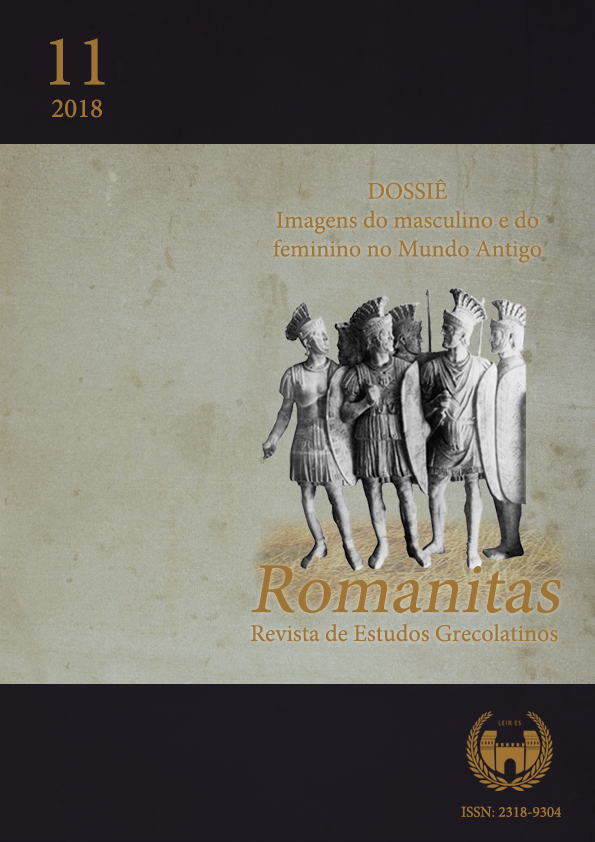Social boundaries and social-political categories in Early Imperial Roman History
DOI:
https://doi.org/10.17648/rom.v0i11.21822Keywords:
Roman Empire, Historiography, Ancient History, Seneca, TacitusAbstract
This article discusses different historiographical approaches that dominated the studies on early imperial Roman history during the 20th and the beginning of the 21st century. In order to do this, it focuses on two historiographic controversies: in the first place, the modernist-primitivist debate concerning economic history; in the second place, the debate about the constitutionalist approach to Roman politics, and the criticism it attracted. We conclude that historians have paid great attention to the elements that characterize the different spheres of social life, and to the reasons why scholars ought to favour one of them - especially whether to consider more structural or more dynamic aspects of social life. Our article considers the challenges in surveying the elements that integrate and separate these different spheres, i.e. the frontiers, suggesting possible approaches to overcome these limits, mainly by paying attention to their boundaries and connections.
Downloads
References
Sources
SENECA. Natural questions. Translated by Harry M. Hine: Chicago: The University of Chicago Press, 2010.
SÉNÈQUE. Lettres a Lucilius. Texte établi par François Préchar et traduit par Henri Noblot. Paris: Les Belles Letres, 1995.
General works
ANDO, C. Imperial ideology and provincial loyalty in the Roman Empire. Berkeley: University of California Press, 2000.
CLOUD, D. The client-patron relationship: emblem and reality in Juvenal’s first book. In: WALLACE-HADRILL, A. (Ed.). Patronage in Ancient Society. London: Routledge, 1989, p. 205-218.
FAVERSANI, F. As relações interpessoais sob o Império Romano: uma discussão da contribuição teórica da Escola de Cambridge para o estudo da sociedade romana. In: CARVALHO, A. G. (Org.). Interação social, reciprocidade e profetismo no Mundo Antigo. Vitória da Conquista: Ed. Uesb, 2003.
FINLEY, M. I. Economy and society in ancient Greece. Harmondsworth: Penguin, 1983.
GAIA, D. V. Le taux d’intérêt et ses variations dans le monde romain, IIIe siècle av. J.-C. – IIIe siècle ap. J.-C. Paris: EHESS, 2009.
GARNSEY, P.; SALLER, R. The Roman Empire: economy, society and culture. London: Duckworth, 1987.
HÖLKESKAMP, K-J. Reconstructing the Roman Republic: an ancient political culture and modern research. Princeton: Princeton University Press, 2010.
JOLY, F. D. Libertate opus est. Escravidão, manumissão e cidadania à época de Nero (54-68 d.C.). Tese (Doutorado em História) – Programa de Pós-Graduação em História Social da Universidade de São Paulo, São Paulo, 2006.
LENDON, J. E. Empire of honour. Oxford: Oxford University Press, 2001.
LOBUR, J. A. Consensus, concordia, and the formation of Roman imperial ideology. London: Routledge, 2008.
MACHADO, C. A. The city as stage: aristocratic commemorations in Late Antique Rome. In: REBILLARD, E.; SOTINEL, C. (Ed.). Les frontières du profane dans l’Antiquité Tardive. Roma: École Française de Rome, 2010, p. 287-317.
MACHADO, C. A. Urban space and power in Late Antique Rome. Oxford: University of Oxford, 2006.
MARQUESE, R. B. Panis, disciplina, et opus servo: the Jesuit ideology in Portuguese America and Greco-Roman ideas of slavery. In: DAL LAGO, E.; KATSARI, C. (Ed.). Slave systems: ancient and modern. Cambridge: Cambridge University Press, 2008, p. 214-230.
MORRIS, I.; SALLER, R.; SCHEIDEL, W. Introduction. In: MORRIS, I.; SALLER, R.; SCHEIDEL, W. (Ed.). The Cambridge Economic History of the Greco-Roman World. Cambridge: Cambridge University Press, 2007, p. 1-14.
POTTER, D. S. Introduction. The shape of Roman history: The fate of the governing class. In: POTTER, D. S. (Ed.). A Companion to the Roman Empire. Oxford: Blackwell, 2006, p. 1-19.
RUDICH, V. Dissidence and literature under Nero: the price of rhetoricization. London: Routledge, 1997.
RUDICH, V. Political dissidence under Nero: the price of dissimulation. London: Routledge, 1993.
SALLER, R. Personal patronage under the Early Empire. Cambridge: Cambridge University Press, 1982.
SYME, R. The Roman revolution. Oxford: Oxford University Press, 1960.
WALLACE-HADRILL, A. Rome’s cultural revolution. Cambridge: Cambridge University Press, 2008.
WALLACE-HADRILL, A. The imperial court. In: BOWMAN, A. K.; CHAMPLIN, E; LINTOTT, A. (Ed.). The Cambridge Ancient History. Cambridge: Cambridge University Press, 1996, p. 283-308. v. 10.
WINTERLING, A. Politics and society in Imperial Rome. Malden; Oxford: Wiley-Blackwell, 2009.
Downloads
Published
How to Cite
Issue
Section
License
Copyright (c) 2018 Romanitas - Revista de Estudos Grecolatinos

This work is licensed under a Creative Commons Attribution-NonCommercial-NoDerivatives 4.0 International License.
a. The authors retain copyright and grant the journal the right to first publication.
b. The authors are authorized to assume additional contracts separately, for non-exclusive distribution of the version of the work published in this journal (e.g., publishing in institutional repository or as a book chapter), with acknowledgment of authorship and initial publication in this journal.
c. Authors are allowed and encouraged to publish and distribute their work online (e.g. in institutional repositories or on their personal page) after the first publication by the journal, with due credit.
d. The journal's texts are licensed under a CC BY 4.0 Deed Attribution 4.0 International Licence (CC BY).




























